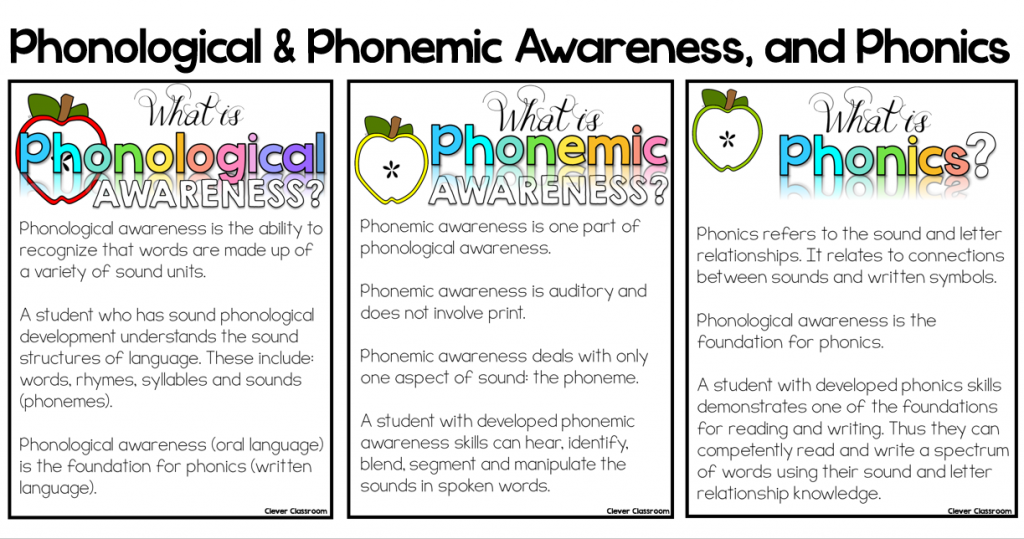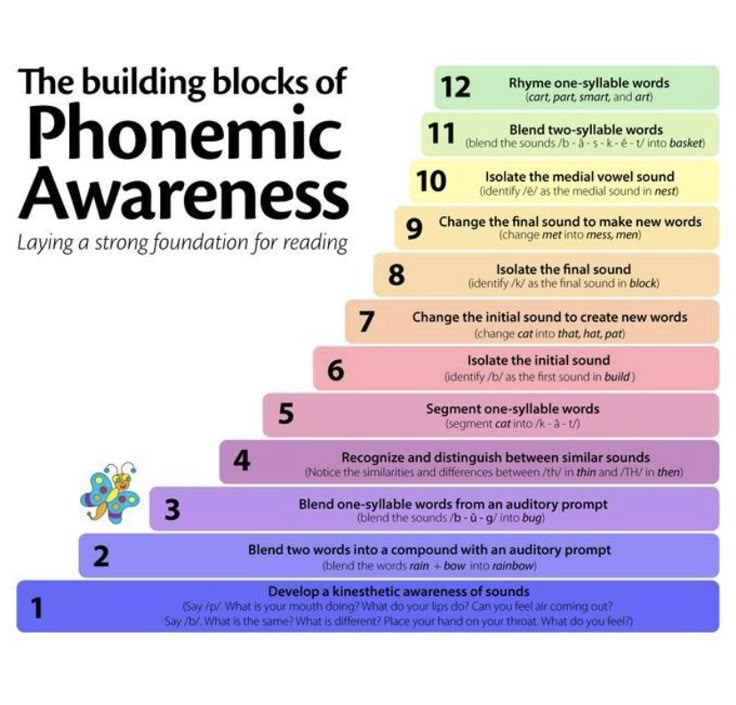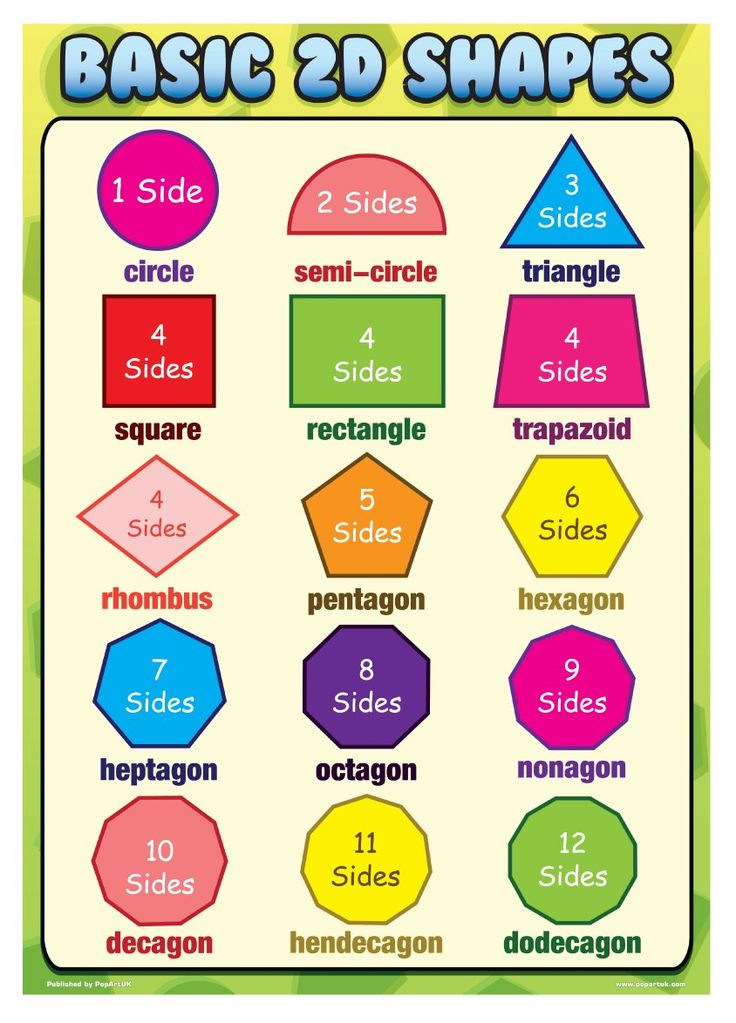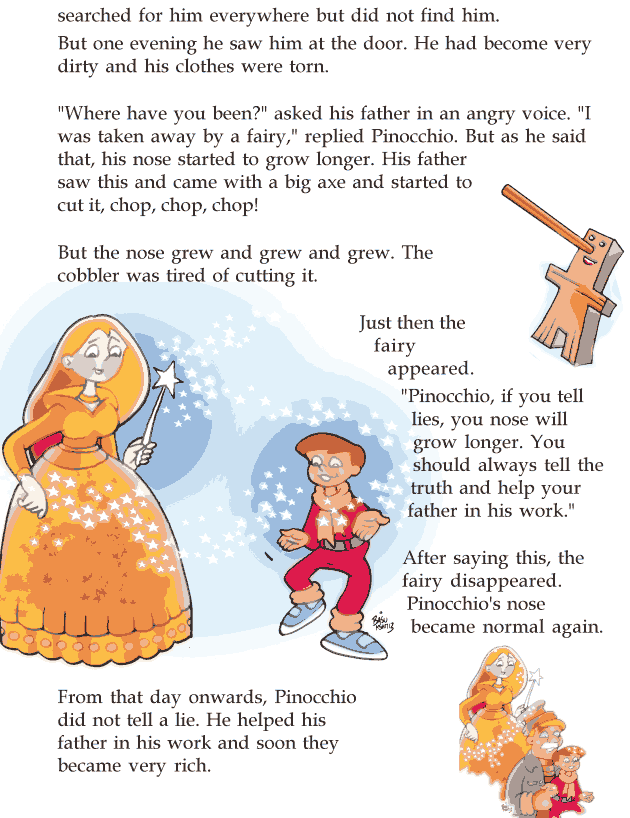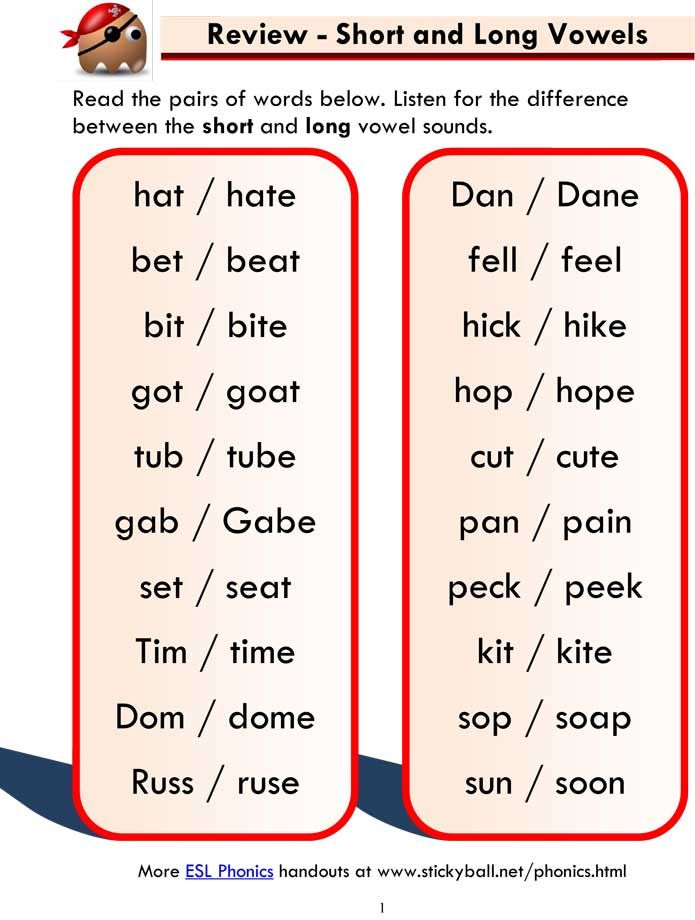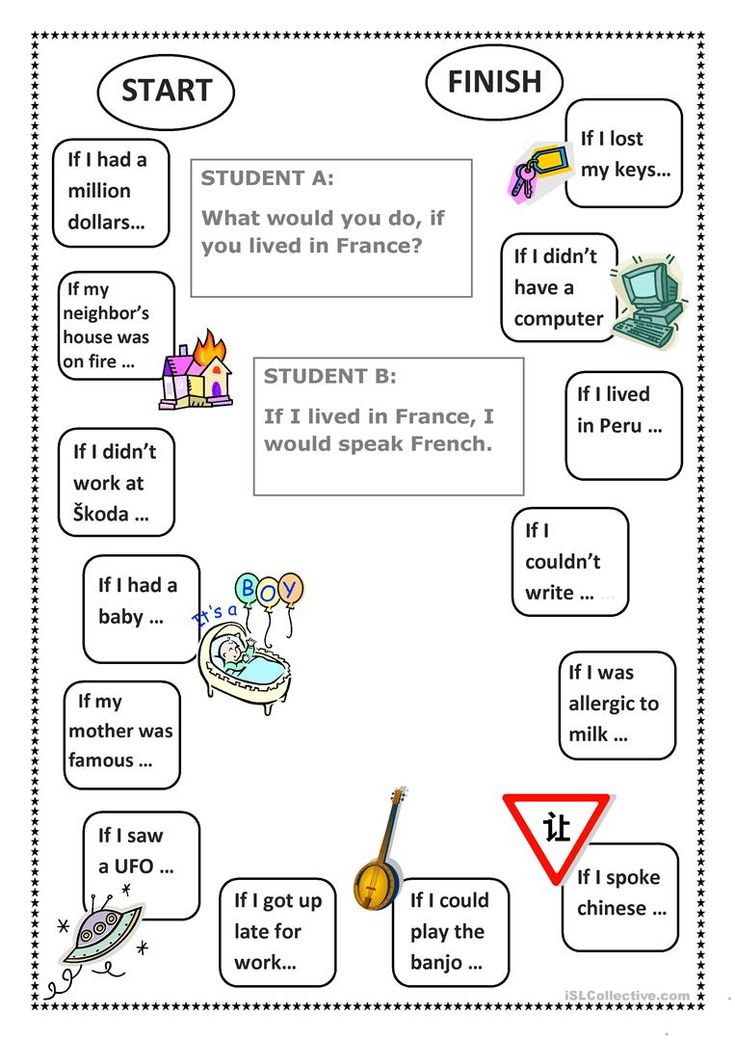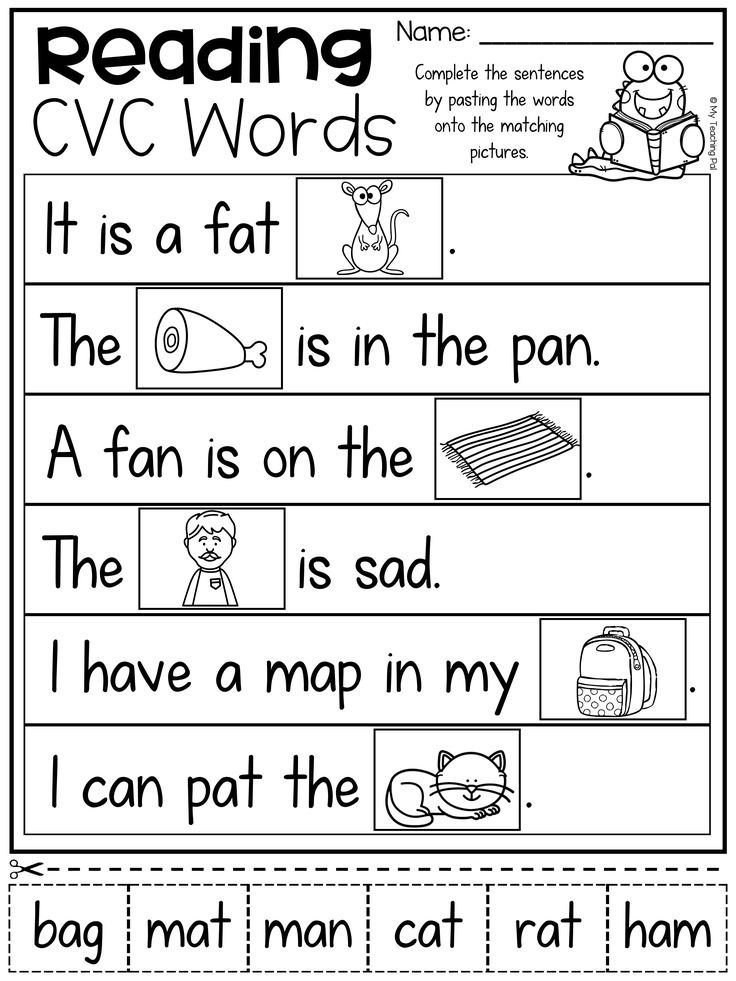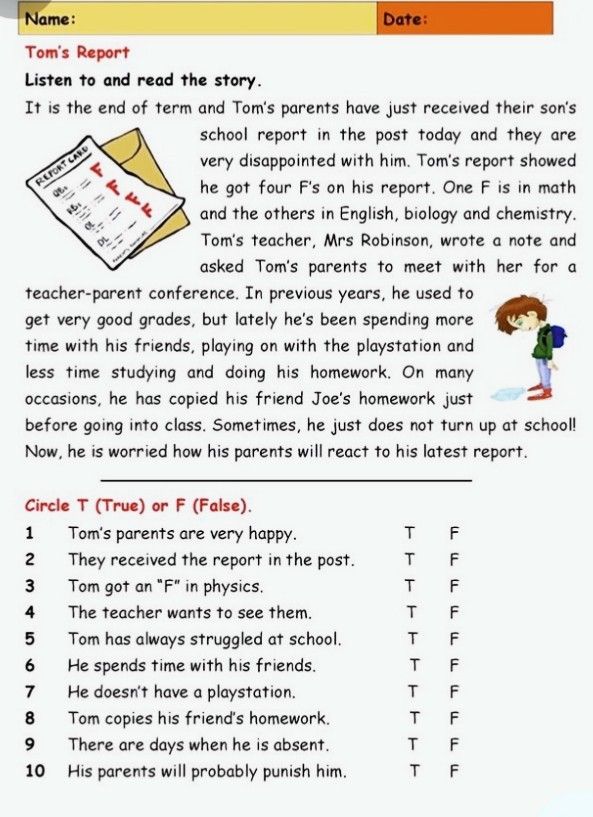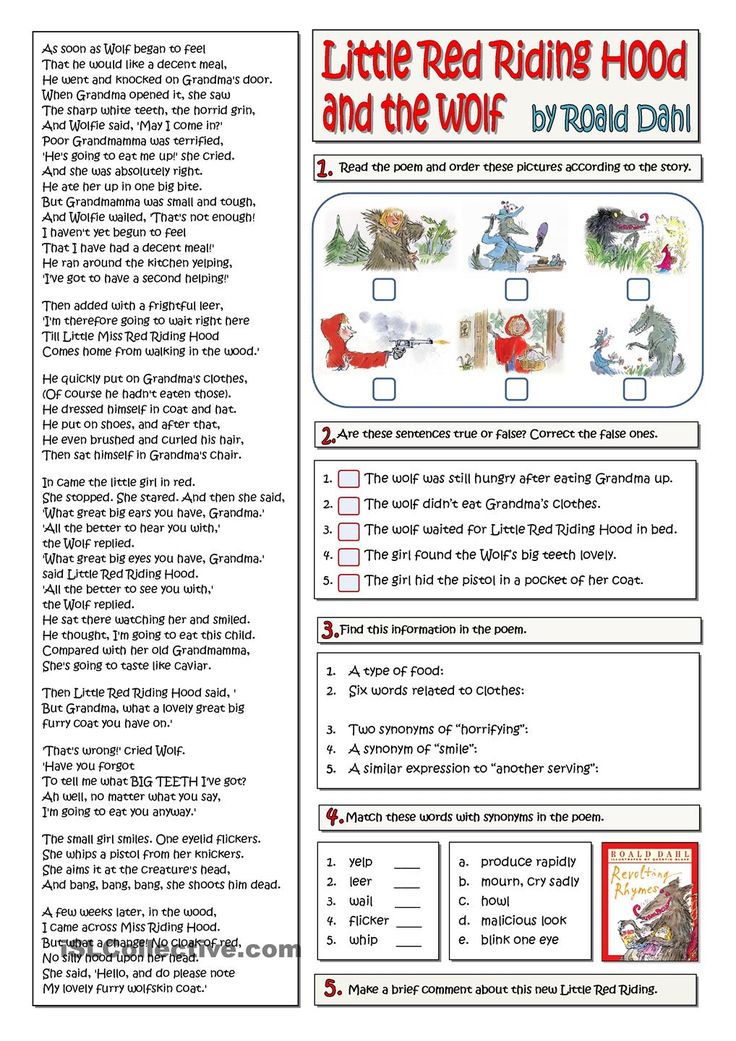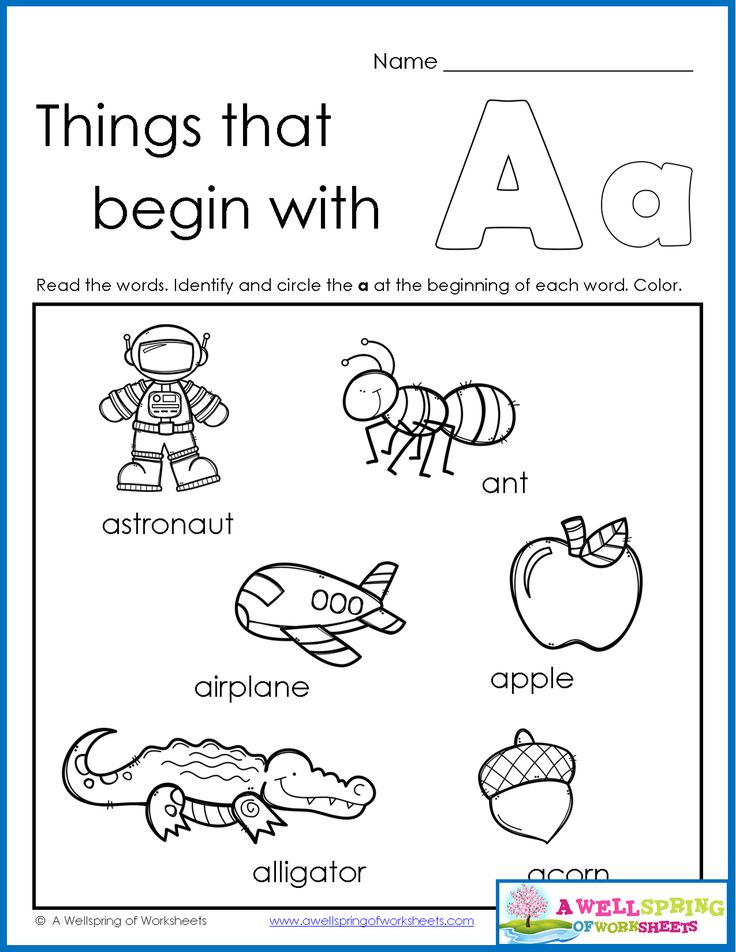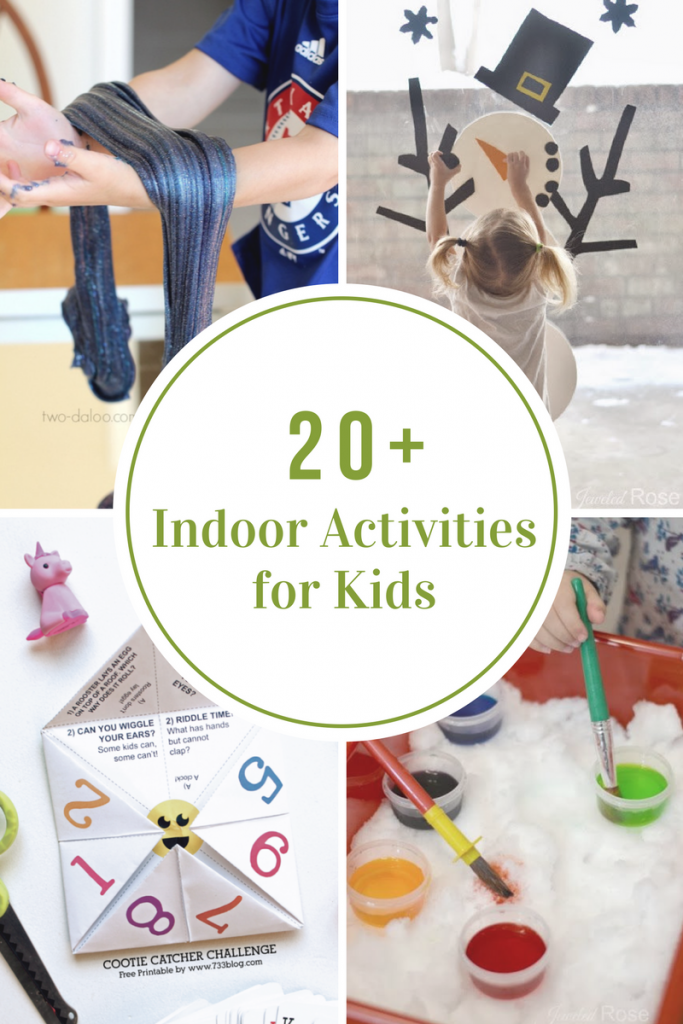Words that rhyme with development
245 best rhymes for 'development'
1 syllable
- Front
- Stunt
- Cunt
- Blunt
- Hunt
- Und
- And
- Must
- Stunned
- Crushed
- Jump
- Loved
- Bust
- Dump
- Bump
- Dust
- Just
- Trust
- Lust
- Pump
- Punt
- Munt
- Drunk
- Trunk
- Touched
- Punk
- Fucked
- Sucked
- Shoved
- Grunt
- Rust
- Shunned
- Funk
- Mund
- Rushed
- Fund
- Brunt
- Gunned
- Trump
- Bunt
- Glunt
- Tucked
- Shunt
- Chump
- Junk
- Stuffed
- Runde
- Kunde
- Crust
- Grund
- Thrust
- Slump
- Lund
- Tunde
- Dunk
- Hund
- Thump
- Thunk
- Hump
- Lump
- Skunk
- Monk
- Yup
- Flushed
- Sunk
- Numbed
- Judged
- Brushed
- Stump
- Upped
- Gump
- Cussed
- Duct
- Gust
- What
- Cup
- Bummed
- Rump
- Buzzed
- Hulk
- Hushed
- Blushed
- Bunk
- Plump
- Thumbed
- Cuffed
- Cult
- Summed
- Nut
- Up
- Tongued
- Gloved
- Clump
- Dusk
- Grump
- Crunk
- Crump
- Brust
- Gushed
- Drugged
- Chunk
- Mugged
- Fussed
- Gummed
- Hust
- Sump
- Mud
- Flunk
- Snuffed
- Musk
- Plucked
- Clutched
- Stunk
- Bucked
- Spunk
- Chucked
- Smudged
- Shrunk
- Lucked
- Cusp
- Mulled
- Slut
- Cut
- But
2 syllables
- Doesn't
- Wasn't
- Judgement
- Confront
- Husband
- Summoned
- Basement
- Moment
- Movement
- Pavement
- Upfront
- Drummond
- Statement
- Pungent
- Adjust
- Affront
- Haven't
- Pregnant
- Present
- Isn't
- Diamond
- Bludgeoned
- Abrupt
- Buttoned
- Loveland
- Toughened
- Adult
- Constant
- Different
- Silent
- Talent
- Violent
- Didn't
- Wouldn't
- Distant
- Couldn't
- Student
- Instant
- Potent
- Ancient
- Troubled
- Decent
- Giant
- Current
- Combust
- Thousand
- Unjust
- Arent
- Payment
- Unloved
- Construct
- Island
- Happened
- Opened
- Second
- Legend
- Shouldn't
- Listened
- Placement
- Succumbed
- Vacant
- Ruined
- Treatment
- Untouched
- Parent
- Pigment
- Struggled
- Brilliant
- Stomach
- Pleasant
- Puzzled
- Peasant
- Dormant
- Stumbled
- Pummeled
- Frequent
- Consult
- Obstruct
3 syllables
- Evident
- Element
- Relevant
- Elephant
- Testament
- Arrogant
- Sentiment
- Excrement
- Settlement
- Elegant
- Sediment
- Regiment
- Eloquent
- Excellent
- Detriment
- Eminent
- Tenement
- Temperament
- Prevalent
- Resonant
- Negligent
- Decadent
- Petulant
- Redolent
- Celebrant
- Maryland
- Permanent
- President
- Innocent
- Confident
- Accident
- Argument
- Dominant
- Instrument
4 syllables
- Irrelevant
- Intelligent
- Experiment
- Embarrassment
- Impediment
- Environment
- Equivalent
- Predicament
5 syllables
- Redevelopment
Want to find rhymes for another word? Try our amazing rhyming dictionary.
If you write lyrics you should definitely check out RapPad. It has tons of useful features for songwriters, lyricists, and rappers.
Phonological Awareness: What Is It? What Are the Developmental Milestones?
Skip to contentPrevious Next
- View Larger Image
By: Katrina Wasserman MA, CCC-SLP
Phonological awareness refers to the knowledge of sounds and how sounds can be manipulated to form words. It is a crucial foundational skill, as it is correlated to success in reading and writing. Prior to phonological awareness, a child must have strong basic listening skills.
Pre-phonological awareness skills include word awareness and enjoying rhyming and alliterations in songs and stories. These skills are generally acquired before the age of 4, and children learn them through songs, nursery rhymes, and finger play songs.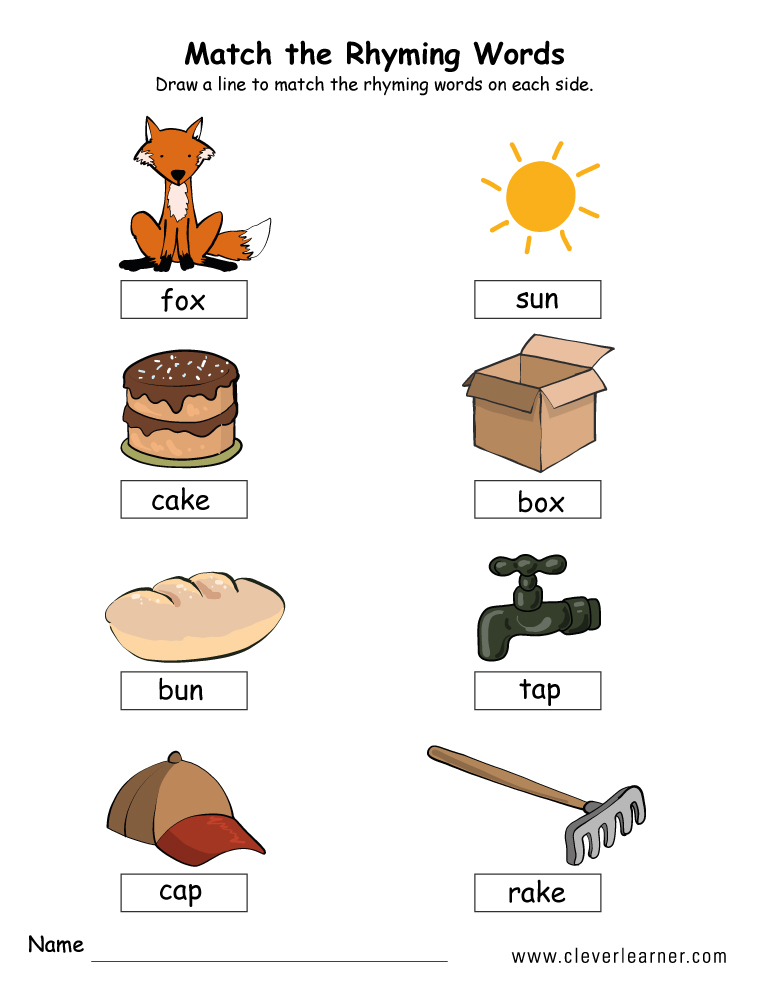 Some songs that highlight these skills include B-I-N-G-O, Hickory Dickery Dock, and Down By the Bay.
Some songs that highlight these skills include B-I-N-G-O, Hickory Dickery Dock, and Down By the Bay.
The first phonological awareness skill to develop is rhyming. Between the ages of 3 and 4, a child begins to generate rhyming words. At this time, the child may have a mix of real and nonsense rhyming words. Children frequently enjoy playing with rhyming words and get excited when they produce a real rhyming word that they haven’t heard before!
Between the ages of 4 and 5, many phonological skills develop. Children will break words into their individual syllables; this is usually achieved by clapping or tapping out the individual sounds in multisyllabic words such as butterfly. Children will begin to recognize two words that begin with the same sound (e.g., dog and dance). Word segmentation and blending are also acquired at this time.
Segmentation refers to the separating of sounds in words and blending refers to the combining of sounds into words. For example, given the sounds S- U- N, the child would blend these sounds together to form the word sun. Conversely, segmentation is when a child is given a word like boat and segments it into its individual sounds B-OA-T. Both sills involve the manipulation of sounds within words. After the child has acquired this skill, he/she should be able to count how many phonemes (sounds) are in a word. (e.g., boat = 3 sounds)
Conversely, segmentation is when a child is given a word like boat and segments it into its individual sounds B-OA-T. Both sills involve the manipulation of sounds within words. After the child has acquired this skill, he/she should be able to count how many phonemes (sounds) are in a word. (e.g., boat = 3 sounds)
Between the ages of 5 and 6, the prior phonological skills are expanded and more finely tuned. Children will be able to blend and segment words that have 4 sounds, specifically with consonant blends (e.g., hand). Children will be able to identify the first and last sounds in a word. Once this skill is achieved, a child will be able to generate words that begin with the same sound.
For example, given the word mop, a child would be able to generate other words that begin with the M sound such mat, make, milk. Auditorally, the child will be able to determine which word does not rhyme in a set (e.g., fin- win- car) and which word is different in a set of three (e.g., pick- pack- pick).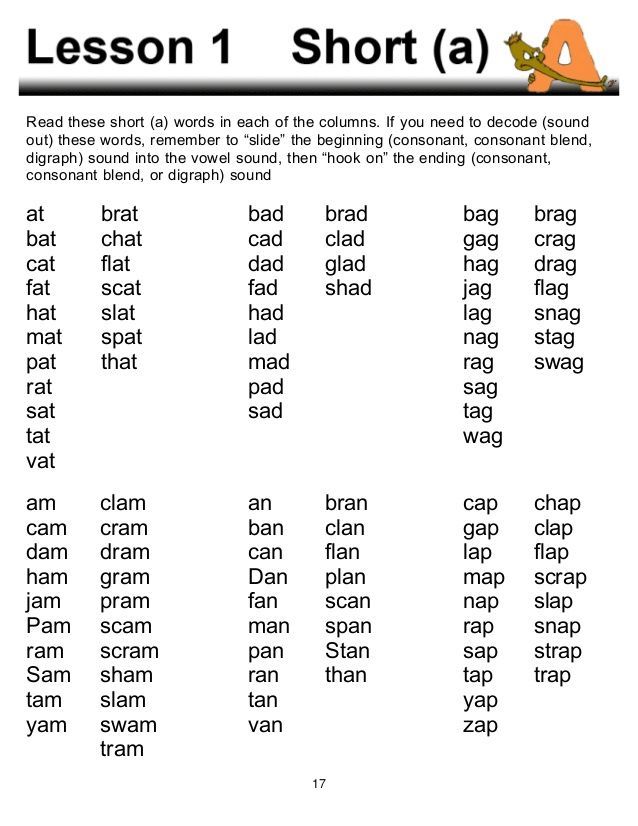
Between the ages of 6 and 7, children’s skills include a variety of higher-level sound manipulation. Children should be able to delete syllables from words (e.g., say the word cowboy, now say it without boy) and delete sounds from words (e.g., say the word mice, now say it without M). Sound and syllable substitutions will be acquired during this time. For example, say the word fast, now change the f to a p (i.e., past).
By the age of 8, children will use their phonological awareness skills in their writing to spell words correctly. Phonological awareness is crucial in a child’s ability to read and write. It enables them to understand that our language is comprised of sounds that work together to form words and is a predictor of reading success.
Check out this chart, which highlights the information above!
If you have questions about your child’s phonological awareness skills or would like to know if therapy is appropriate for your child, contact us today!
Page load link Go to TopLearning rhymes with a child.
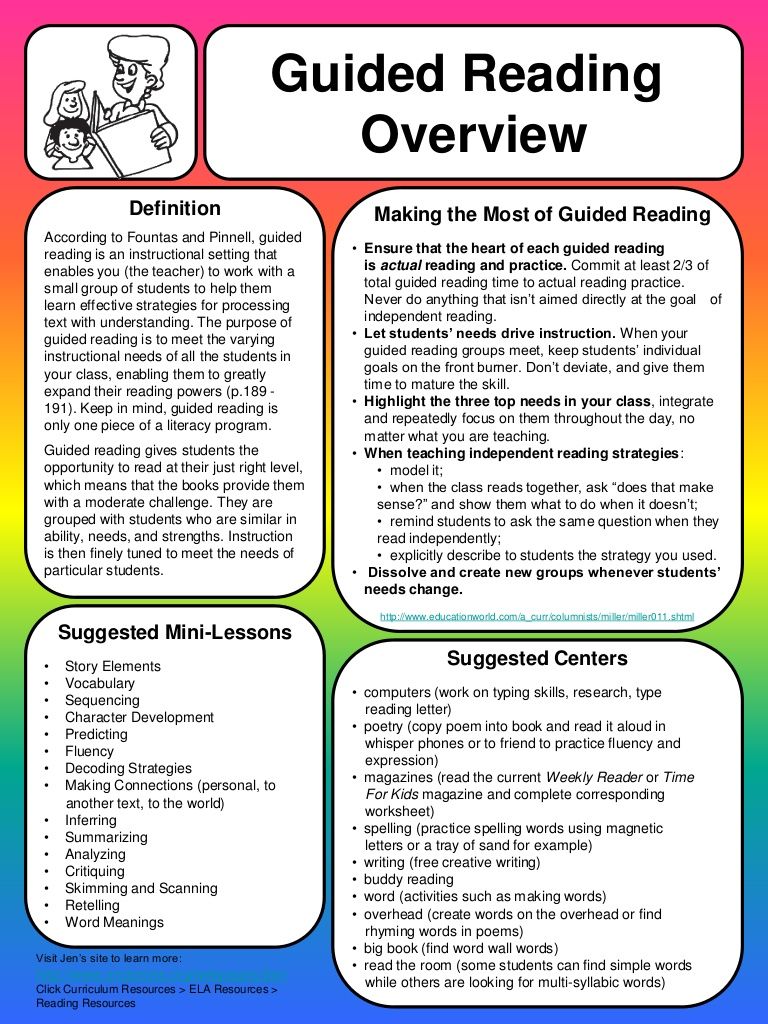 Rhyming games for the development of children's speech
Rhyming games for the development of children's speech Purpose: form an idea of the rhyme
Tasks:
Clarify the concept of tongue twister.
To develop diction in children.
Introduce the concept of "rhyme".
To teach to invent the simplest rhymes for words.
Learn to work together, together, amicably.
Materials and equipment : ball, cards from the book “Speech games game library. Issue 11. We play rhymes. Games for the development of phonemic perception» nine0005
1. Speech warm-up
Dictionary exercise: pronounce intonation, highlighting the highlighted word in turn:
We are playing with words - we compose together,
We play with words - we compose together ,
Our meetings are good, we have fun from the heart!
We play with words - we compose together,
Our meetings are good , have fun from the heart!
Children with teachers remember what a tongue twister is and why it is needed.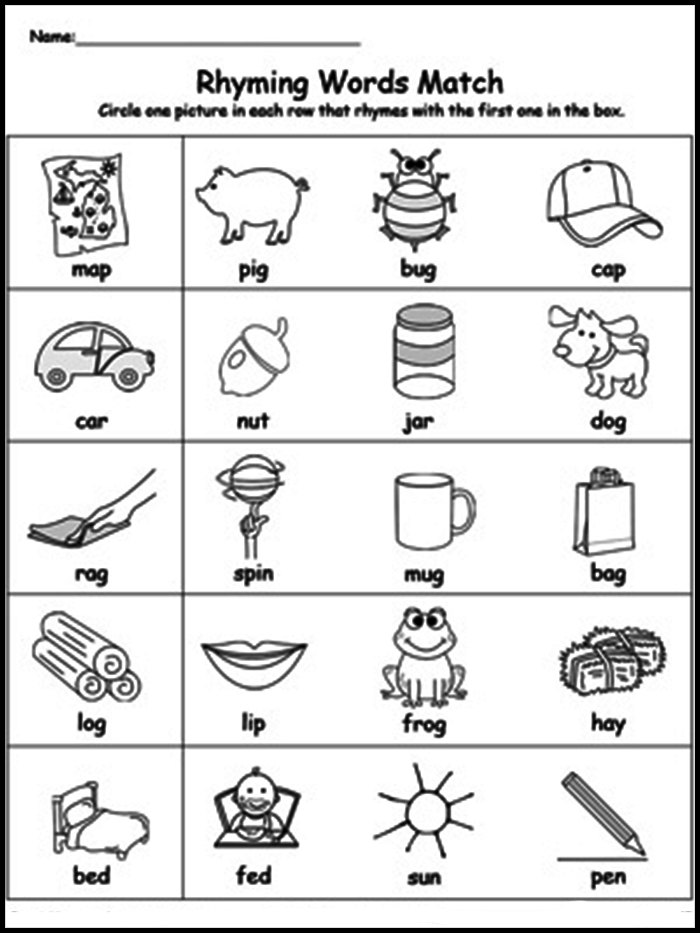 Then they, at will, pronounce any tongue twisters. nine0005
Then they, at will, pronounce any tongue twisters. nine0005
And learn new ones:
Buying a parrot,
Buy without fear:
Frightened parrots
Wake up the whole neighborhood. (Heinrich Wardenga)
There was a drama at the ball:
Noble Cavalier
From under the nose of a noble lady
Stole one eclair.
And another eclair,
And another eclair,
And one more eclair -
Here's your cavalier. (Peter Sinyavsky)
2. Speech situation nine0004
Conversation
Educator: Have you ever tried to become an echo? How does echo respond to questions? I'll ask, "What time is it now?" And is it for me?
Children: An hour! Hour!
Educator: That's right, "Hour!" That's how you are: if you become an echo, then answer the questions as it is. And to make it more fun, clap your hands when answering. The answer is two claps at the same time.
Caretaker (children)
Get ready, kids! (ra-ra)
The game is on! (ra-ra) nine0005
Don't be sorry for your hands (lei-lei)
Hand clap more fun (lei-lei)
What time is it now (hour-hour)
What time will it be in an hour (hour-hour)
And it's not true, there will be two (two-two)
Think, think, head (wah-wah)
How the rooster sings in the village (uh-uh)
Yes, not an owl, but a rooster (uh-uh)
Are you sure so (so-so)
How is it really? (how how)
What is twice two? (two-two)
My head is spinning! (wah-wah)
Is it an ear or a nose? (nose-nose)
(leader holding ear)
Or maybe some hay? (carriage-carriage)
Is that an elbow or an eye? (eye-eye)
(leader points to elbow)
But what do we have here? (us-us)
(leader points to nose)
You are always good (yes-yes)
Or only sometimes (yes-yes)
Do not get tired of answering (chat-chat) when answering “no” fine
Please be quiet (-) nine0005
Game over. And those who have "blundered" and gave their phantom to the presenter are waiting for a fun task to be completed.
And those who have "blundered" and gave their phantom to the presenter are waiting for a fun task to be completed.
Educator: Since ancient times, people, writing proverbs, riddles, tongue twisters, have tried to decorate these works of oral folk art by rhyming the ends of lines.
Thanks to rhyme, verses are collapsible. Rhyme is when words end the same way. For example, a cat - a spoon, a bump-mouse, a spruce-strand, a rose-mimosa, a sideboard-stool, an owl-head, a river-stove, etc. These words sound like the last syllables. Such ends of words are called rhymes. nine0005
Rhyme - the consonance of the ends of poetic lines.
After that, the children find the rhyme in the poems "Firs" and "Vanechka the Shepherd"
Spruce
Fir-trees on the edge
To the top of the sky -
I listen, they are silent,
Looking at grandchildren.
And grandchildren - Christmas trees,
Fine needles -
At the forest gate
Dance.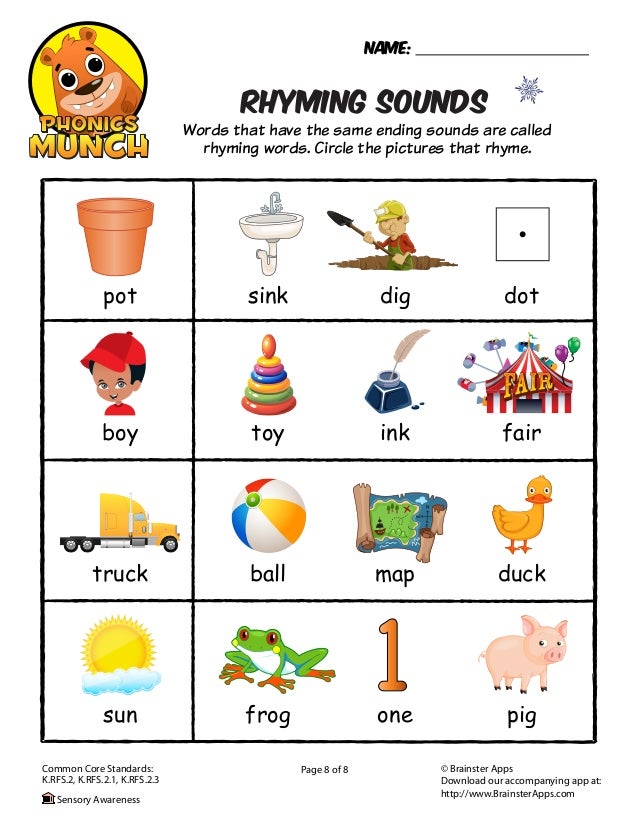 (Irina Tokmakova)
(Irina Tokmakova)
Vanechka is a shepherd nine0004
Sheep are standing in the meadow
Wool rolled into rings,
And plays for the sheep
A little man on the flute.
This is Vanya, the shepherd!
He has good hearing.
He hates the wolf too,
He won't hurt a lamb,
No matter what.
Vanya be a violinist! (Yunna Moritz)
Think of a rhyme game
Educator: Guys, I have a rhyming ball in my hands. Let's play rhyming words. nine0005
I give a word, throw a ball, and whoever catches picks up a rhyme.
Friend (bow), crow (crown), business (boldly), shed (loaf), house (gnome), sleep (ringing), pillow (frog, bun, cheesecake, toy, girlfriend), path (bast basket, potatoes , cover, okroshka), pencil (jumble, hut, gouache, mirage, crew) ...
Match-up game
Educator: Now look carefully at the pictures in front of you and find the words that rhyme with each other.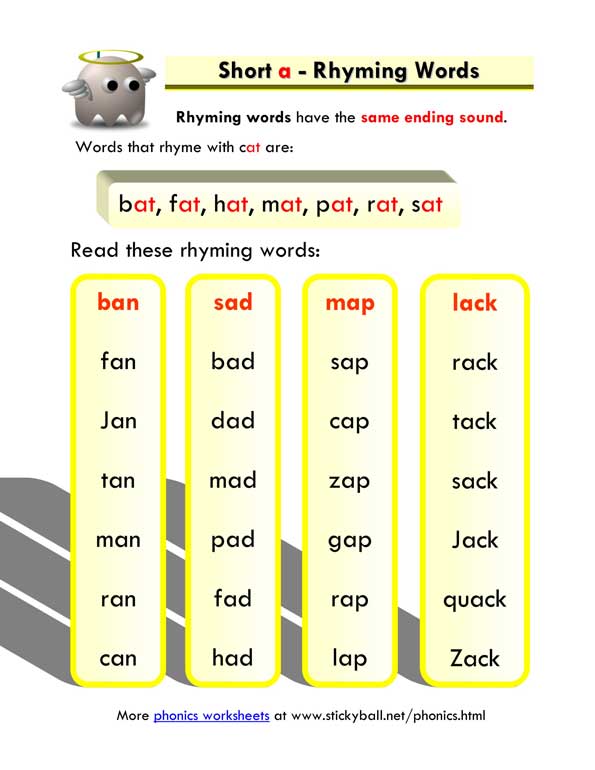
Educator: There is another game for you.
I will start poetry now
I will start and you will finish
answer in unison.
Gray wolf in dense forest
I met a red… (fox).
Where did the sparrow dine?
In the zoo with ... (animals).
A rooster with prickly hedgehog
Cut fat with a sharp ... (knife).
Not scratchy, light blue,
Hung in the bushes ... (hoarfrost).
In winter, there are apples on the branches! nine0005
Collect it quickly!
And suddenly - apples fluttered.
After all, this is ... (bullfinches).
Game "Prompt the word" based on a poem by John Ciardi.
About amazing birds
Outdoor
Passerby
I saw it yesterday.
He was carrying a box,
On drawer
Written: “Game”.
I am two blocks away
followed him
(Believe me, I'm not lying).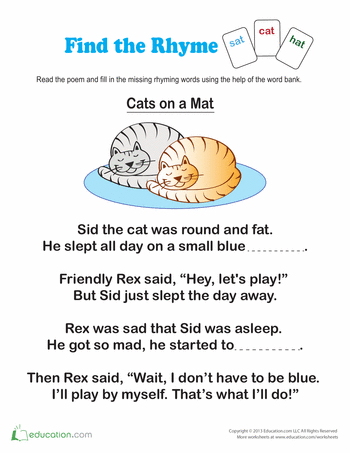
Finally nine0005
Asked him:
How to play
In game?
he smiled
Polite,
Then he answered me:
Sure
What is a game
You haven't met yet.
Two birds
Amazing
I have it in my box.
And if you want,
That's with you
We will play together.
And so that we
We could start
You must remember nine0005
What is dissimilar
These birds
SIMILAR TAILS.
Catch
Such funny birds -
Very hard work.
No wonder people
Smart
Their rhymes
Name.
Indeed,
Nimble birds
From the large box
Suddenly started
Pull out
Top
Behind the word, the word.
One got
The word NAIL, nine0005
Other immediately -
GUEST and CANE.
One got
Word SAD,
Another phrase:
LET IT GO!
One got
Word ELEPHANT,
Around the age of 4-5, children discover that many words sound coherent and rhyme with each other.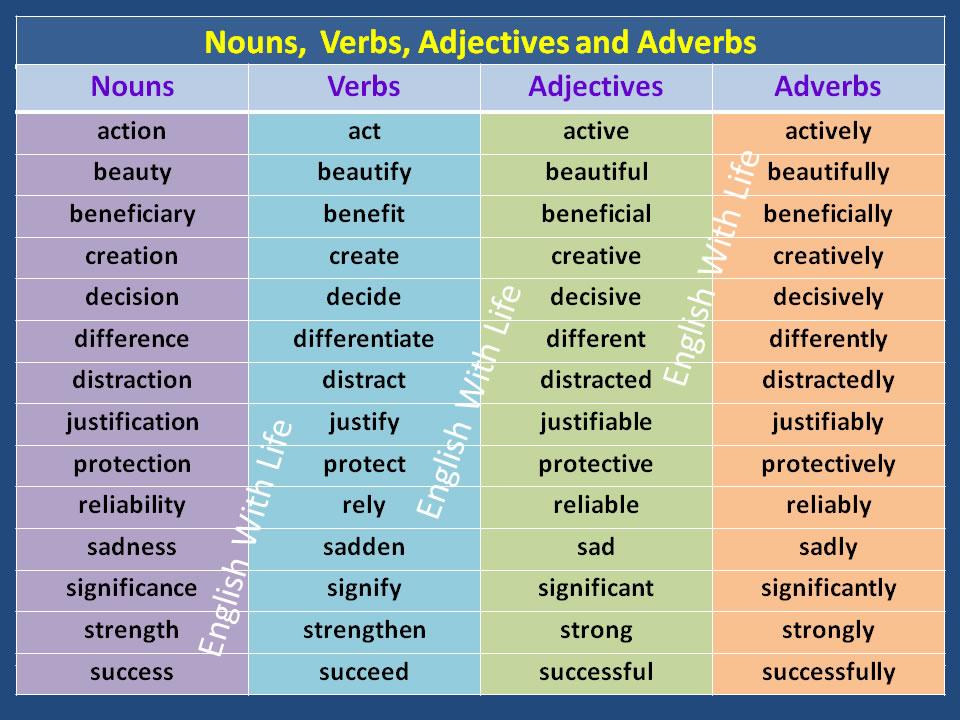 Speech games, including rhymes, not only teach writing techniques, but also replenish the active vocabulary.
Speech games, including rhymes, not only teach writing techniques, but also replenish the active vocabulary.
In addition, it is very fun to rhyme in one line or even a poetic work of words that are not related in meaning! After all, you can make sense. For example, what does “cat” have to do with it when we said “spoon”? This is how funny poems are born...
Play rhyming with your children. And we will suggest some simple but exciting games for given rhymes.
“Secret transmission”. Pick up the ball and agree with the child that you are scouts. One scout passes a secret packet (ball) with a password to another. The second scout must say a response - a rhyme to the password, and then come up with his own password to transmit the secret package. You can complicate the game by connecting more participants to it, and even increasing the pace - for example, “get on your nerves”, counting out loud “one ... two ... three!”. nine0005
“Rhymes to the theme”. Prepare two jars or boxes and a few chips.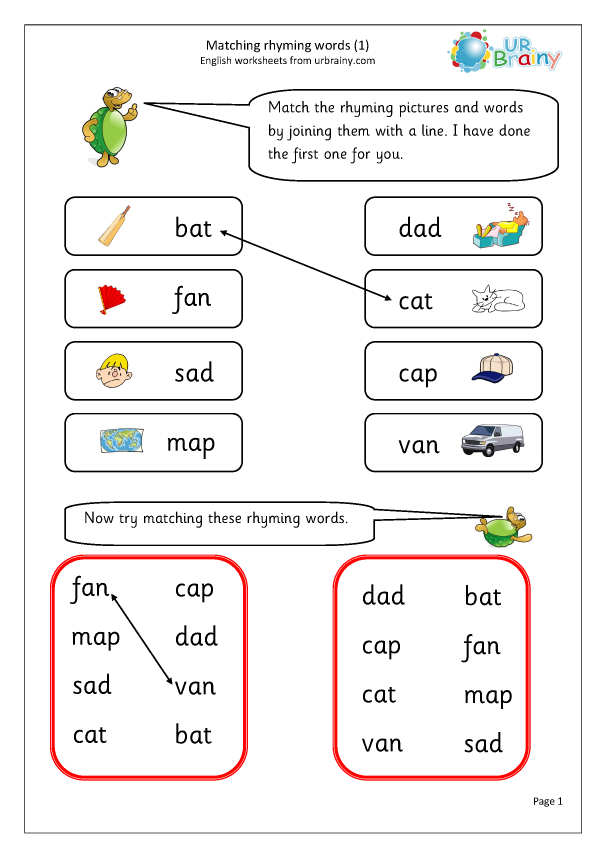 Agree on what topic you are rhyming about, let's say "nature". Who remembered the rhyme - he puts a chip in his jar. Bear-bump. Bush crunch. Who is bigger?
Agree on what topic you are rhyming about, let's say "nature". Who remembered the rhyme - he puts a chip in his jar. Bear-bump. Bush crunch. Who is bigger?
“Talking pictures”. Looking at illustrations in any books, choose pictures and come up with rhymes for them. Complicate the game: think and say a rhyme aloud, and let the child find in the picture the object for which you chose the rhyme. nine0005
“Rhyme in image”. Fantasize! Depict rhyming objects, animals, phenomena with the help of plasticine sculptures, applications, crafts. Create an exhibition of rhymes - and make riddles for your guests! For those guests who find more rhymes at your exhibition, prepare special prizes.
“Rhyme one, rhyme two, dizzy”. Come up with children with poems, the beginning of which is given only in the first line. Some rhymes for words are easy to pick up, but fitting them into the rhythm of a poem is a more difficult task. Develop along with rhyme, and your baby will never have problems with rich figurative speech! nine0005
Poems are the first literary works that children get to know.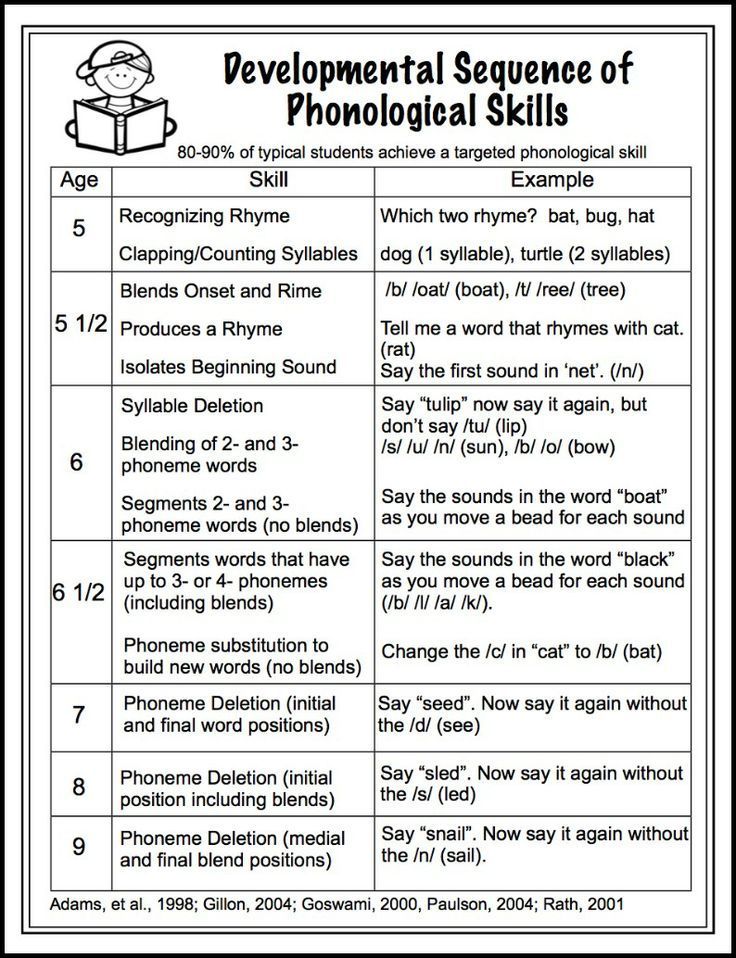 From birth, babies were always sung lullabies, told nursery rhymes, jokes. Our ancestors did not know the mechanism of the influence of poetic forms on mental development. It was intuitive. Mothers lulled newborns with lullabies and entertained them with jokes. Scientists of the 20th century proved the influence of early communications with a child on his speech development.
From birth, babies were always sung lullabies, told nursery rhymes, jokes. Our ancestors did not know the mechanism of the influence of poetic forms on mental development. It was intuitive. Mothers lulled newborns with lullabies and entertained them with jokes. Scientists of the 20th century proved the influence of early communications with a child on his speech development.
Children who were read books from birth began to talk earlier than those who were left to themselves. nine0005
He hears his mother's speech, gets used to it, eventually recognizes individual words, feels the rhythm of speech. Emotionally colored speech attracts attention.
All this is of great importance for the formation of his own speech after a short time. Rhymed nursery rhymes and jokes are perceived best. Children love rhythm and expressive reading. Words that are similar in pronunciation are easier to remember due to associative links. Parents are surprised when at an early age children immediately memorize poems.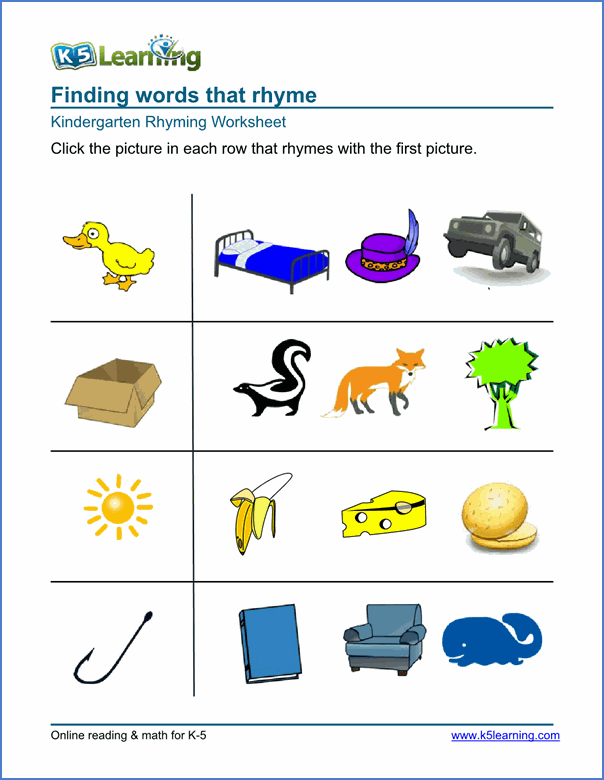 This is a very good brain training, you need to support the kids in every way to repeat, and later - to the selection of rhymes. It's fun and most importantly, it's useful. nine0005
This is a very good brain training, you need to support the kids in every way to repeat, and later - to the selection of rhymes. It's fun and most importantly, it's useful. nine0005
Rhymes develop phonemic awareness, auditory perception and language sense.
Rhymes for children under 3 years old
Their baby begins to distinguish from speech quite early. Reading must be accompanied by facial expressions. Rhymes should be simple: bull - barrel, cat - mouth, ball - jump .
Very useful for the formation of a sense of rhythm are such rhymes that you can choose yourself for almost any action:
- sha-sha-sha-sha-sha, the porridge was good ;
- zhu-zhu-zhu-zhu-zhu, I'm friends with the guys ;
- goo-goo-goo-goo, I'll run away quickly etc.
The meaning here is secondary, the main thing is rhythmic speech and repetitive syllables. With older children, on the basis of such “tambourines”, you can come up with games for the first versification.
Rhyme for preschool children contributes to faster memorization.
You can use short poems for educational and educational purposes. For example, learn the colors of a traffic light and their meanings, the names of animals, fruits, vegetables, etc. With the help of poetic texts, you can memorize almost any material. nine0005
How to explain the concept of rhyme to a child
Rhyme is a combination of the melody of words that have the same stressed vowels. In children's poems, common exact rhymes are usually used: sun - window, cat - mouth, bridge - growth , etc. More complex, original rhymes are found in older poetry.
Types of rhymes
- Men's. The stress falls on the last syllable (home - young) .
- Women's. The stress is on the penultimate syllable (gold - rich) .
- Dactylic. The stress falls on the third syllable from the end of the word (pothole - hollow) .
- Hyperdactylic.
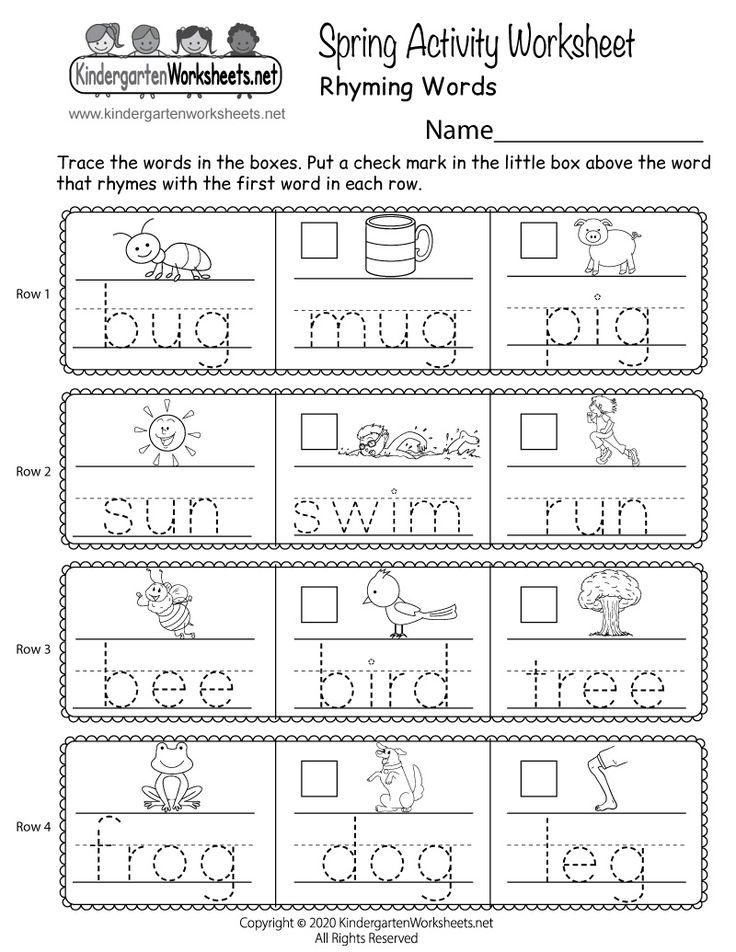 The stress falls on the fourth or subsequent syllable (stretched - touched) .
The stress falls on the fourth or subsequent syllable (stretched - touched) .
To explain to a child what rhyme is, one can give an example familiar to many from the fairy tale “Dunno in the Sunny City”.
Recall that the main character decided to start writing poetry and picked up rhymes for words. The poet explained to Dunno that words should end the same way. As a result, Dunno rhymed "stick" and "herring". nine0005
Thus, it is not enough for words to have the same ending.
Definition for children! Rhyme - these are words similar in sound: Masha - porridge, nut - seagull, concrete - token and others.
Words do not have to end in the same way - the main thing is that they are combined with each other (icy - does not go) .
The sequence of teaching preschoolers to compose rhyming texts
Preschoolers from 3 to 5-6 years old have a penchant for versification. They really like the combination of words, word creation is actively manifested when children come up with their own words that are understandable only to a narrow circle of people.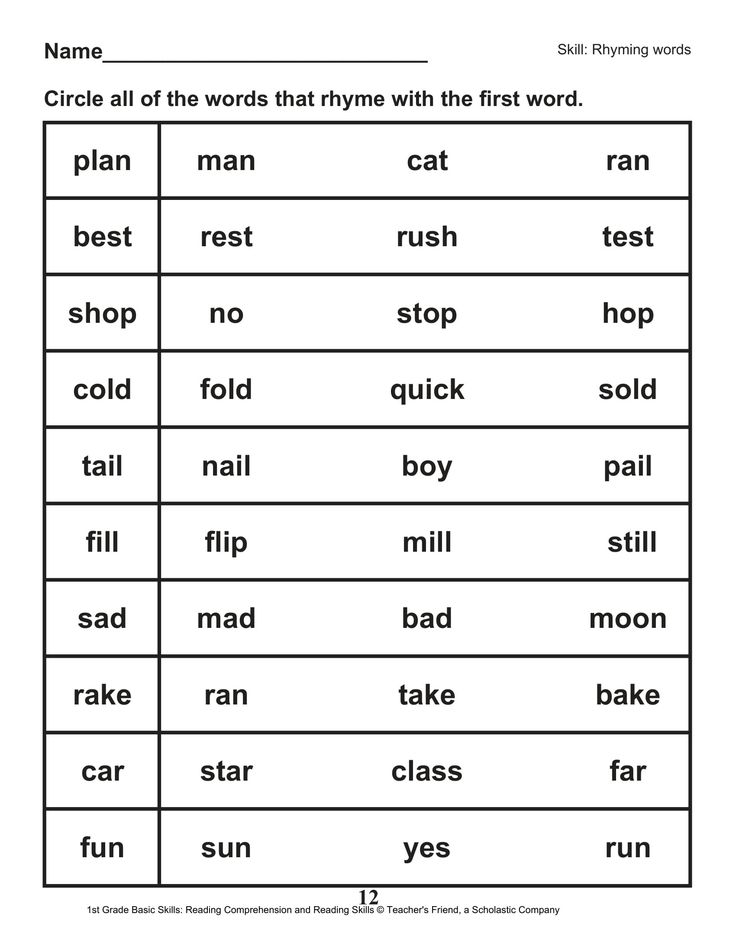 nine0005
nine0005
Verbal experiments should never be interfered with. On the contrary, you need to support the child in finding rhymes and writing. This forms a sense of the beauty of speech, the native language and develops the imagination.
Formation of interest in poetic texts will help the child to better understand and perceive poetry in the future.
Stages of teaching rhyming texts to preschoolers
1. Children need to be introduced to the algorithm for creating rhyming text. First, they are introduced to the concept of rhyme and its location (at the end of the line). nine0005
An approximate algorithm that can be offered to a preschooler from 4 years old:
1) Once upon a time...
2) Who or what was their name...
3) What did you do?
4) Conclusion. Everything that can be said about the object.
The algorithm changes depending on the theme of the poem and the objectives of the lesson.
2. Creation of a simple algorithmic poem with an adult.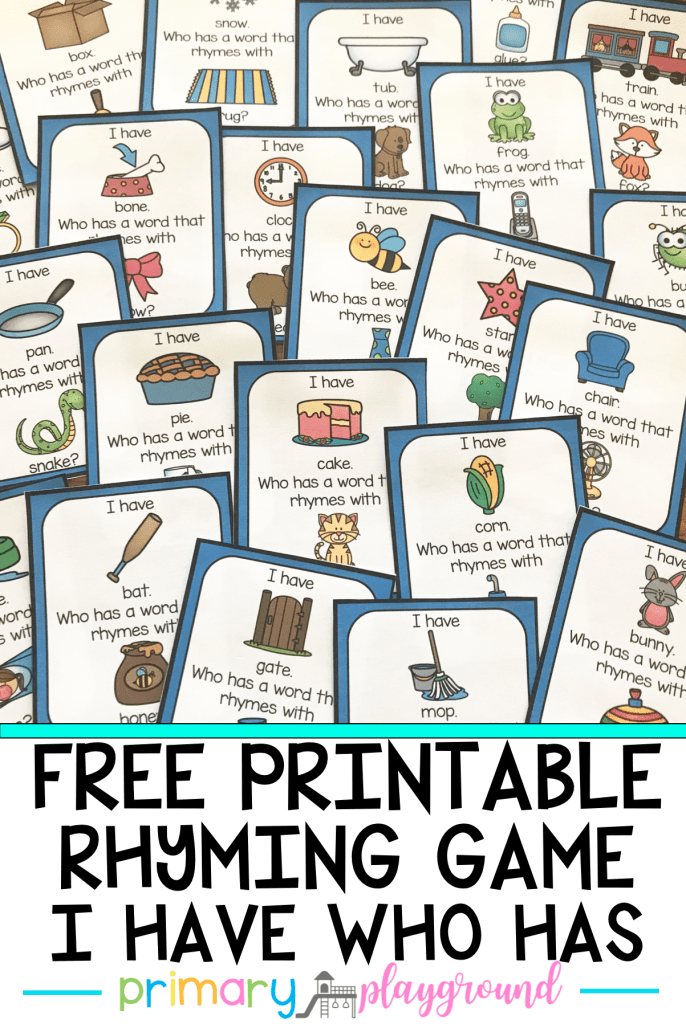
3. The child tries to come up with a short poetic text on his own. You can’t push a preschooler, make fun of his attempts or put too much pressure. The process should captivate the baby. If he fails, an adult helps. Sooner or later, the child himself will learn to pick up rhymes. nine0005
Burime: examples of rhymes for children
Burime - writing poems on given rhymes. This literary game appeared in France in the 17th century. Entertainment quickly gained popularity. The nobles competed with each other in wit. Now this game is undeservedly forgotten.
Classic game rules:
Rhymes must be heterogeneous;
They must not be changed;
The theme of the poem is agreed in advance.
For children, of course, the game is adapted to the age and individual abilities. nine0005
Preschoolers can be encouraged to write their own poems.
A couple of rhymes are selected, then with these words you need to come up with sentences. For example, take a pair of "nibbles - crawls" .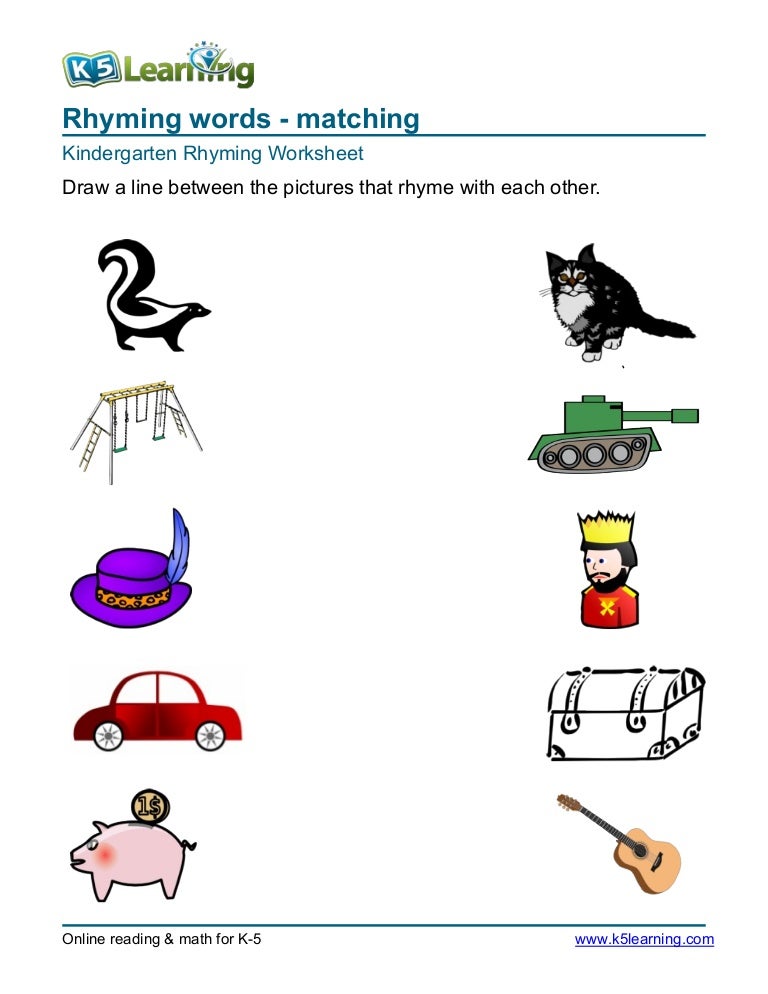 First, the child comes up with the first sentence. Usually it turns out a simple non-common sentence like "The puppy nibbles." An adult with leading questions helps to complete the sentences. Questions might be:
First, the child comes up with the first sentence. Usually it turns out a simple non-common sentence like "The puppy nibbles." An adult with leading questions helps to complete the sentences. Questions might be:
How is the puppy feeling?
What do puppies usually chew on? nine0005
Where is the puppy chewing?
Work with the second sentence continues on the same principle.
Something like this might turn out:
The gray mouse quietly crawls into its house.
A child will remember such poems of his own composition for a long time.
Rhyming games for preschoolers
Preschool children learn everything through play. Classes for the selection of rhymes can be carried out not only at home. They can be used as a leisure activity on the road, on a walk or in a long queue. This will entertain the child and help the development of speech. nine0005
Rhymes for preschool children will be a great alternative to a tablet or cartoons.
1. The pictures show objects that rhyme with each other. The child must connect them with lines. You can make these tasks yourself or purchase a ready-made manual.
2. In kindergarten, and later in elementary school, funny riddles for children with answers in rhyme are widely used.
I am in a dense forest
I saw a red ... (fox).
Seeing a boy for the first time:
I ran across the clearing ... (bunny).
All girls and boys
3. The child is asked to find rhyming pairs among chains of words.
Cat, house, mouth;
Sleep, drink, whale;
Shepherd, rooster, package.
4. A game for two or more children - come up with as many rhymes as possible for a word. The word must be short and known to all participants.
5. An adult pronounces repeated syllables. It stops when the child says a rhyme. Examples:
- ha-ha-ha-ha-ha - foot ;
- ba-ba-ba-ba-ba - trumpet ;
- la-la-la-la-la - yule .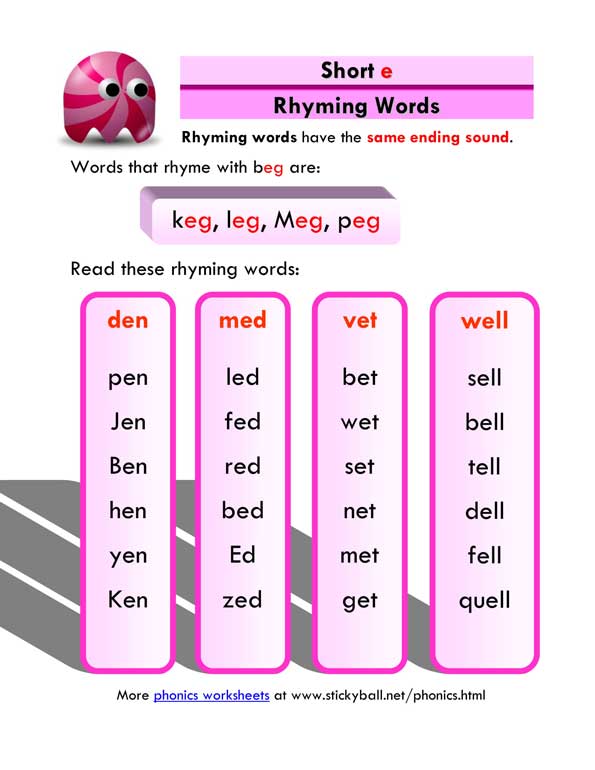
Reading children's poems and their own first poems will contribute to the development of speech in preschoolers and develop creative abilities.
Reference:
Materials prepared by the Federal educational service "InPro" ® (License of the Ministry of Education and Science 22L01 No. 0002491). We prepare children for school all over Russia in 40+ centers and online, including in the city. Classes in your city. nine0005
Free hotline: 8 800 250 62 49 (from 6 to 14 Moscow time).
Support the project - donate 49 rubles. via secure money transfer from Yandex:
- Vkontakte:
Academy of educational games. For children from 1 to 7 years Novikovskaya Olga Andreevna
Match the rhyme
Ask your child to help write short rhymes. Say the words of the couplet, stopping at the last word. The last rhyme word is selected together with the baby (he needs to be offered a choice of 2 words). nine0005
Where are you going, Marina?
Into the forest where the ripe…
The rhyme offers a choice of berry names: “raspberry” and “blueberry”.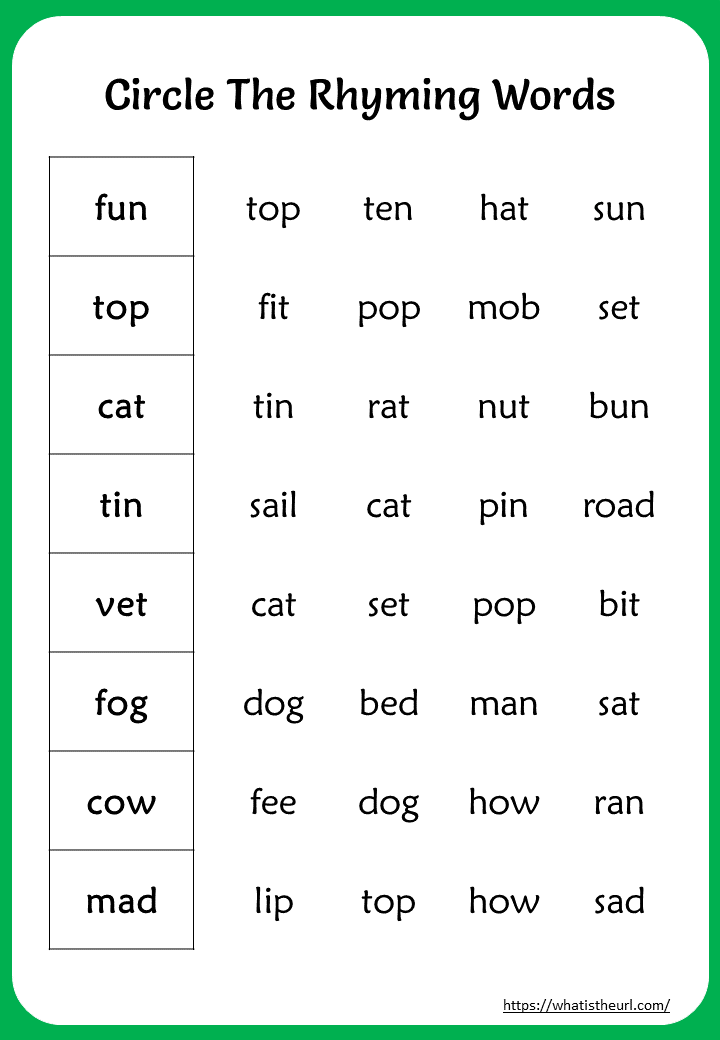 If the child finds it difficult to make a choice, then the adult pronounces a couplet first with a non-rhyming word, and then with a rhyming one, inviting the child to choose the one that sounds better. When the rhyme word is chosen, the child repeats the rhyme on his own: “Where are you in a hurry, Marina? In the forest, where ripe raspberries.
If the child finds it difficult to make a choice, then the adult pronounces a couplet first with a non-rhyming word, and then with a rhyming one, inviting the child to choose the one that sounds better. When the rhyme word is chosen, the child repeats the rhyme on his own: “Where are you in a hurry, Marina? In the forest, where ripe raspberries.
Couplet examples:
We bought a cat
For the holiday… (Bow, boots)
I sewed a shirt for a bear.
I will sew him… (Jacket, pants)
We will wash now,
Need soap, need… (Powder, basin)
My sister
Long… (Pigtails, ponytails)
On a swamp
Grew up… nine0396 (Berries, mushrooms)
We visited the forest,
We saw there… (bear, fox)
sat by the window
Grey… (Cat, dog)
I have a heavy load,
I bring home… (Apples, watermelon)
I will buy you… (Pie, kalach)
Presented to a bear
Happy Birthday… (Typewriter, books)
Tears flow from Oksanka:
Her… (Skis, sleds)
The dog brought a bouquet to the goat -
She will be hearty… (Dinner, lunch)
The kitty was bitten by a fly,
And the kitty hurts .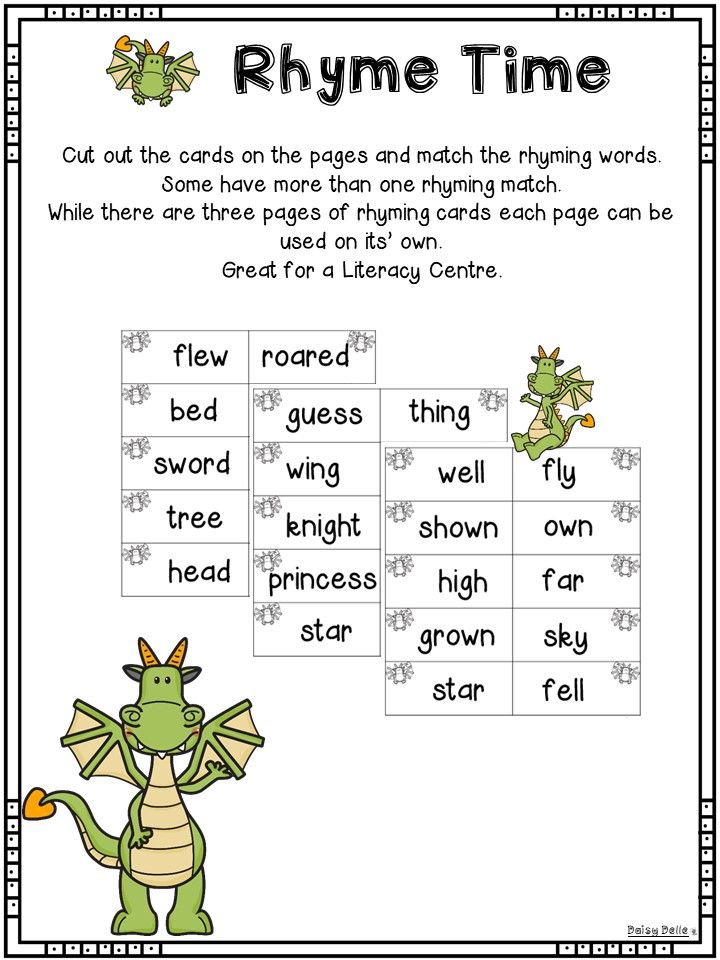 .. (paw, ear)
.. (paw, ear)
The game activates attention, develops speech hearing, teaches the child to select rhymes.
From book Encyclopedia of Early Development Methods author Rapoport Anna nine0005
Pick up the cap Slowly unscrew caps and stoppers from bottles and jars of various sizes. Show your child how to fit and screw on the lids. Then stir the lids and arrange the bottles and jars on the table. Have your child find the lids for each
From book Academy of developing games. For children from 1 to 7 years old author Novikovskaya Olga Andreevna
Match to shape Prepare three balls, three cubes, three bricks, three prisms of the same color. Arrange all these items on the table separately. Show your child how to choose only cubes among objects. At the same time, say: “This is a cube. And here's another cube. And the same cube. nine0005
From book author
Pick up cover Prepare three or four small boxes of various shapes and sizes with removable lids, for example, square, round, rectangular, triangular, oval, heart-shaped . .. Place the boxes on the table and remove the lids. Offer the child again
.. Place the boxes on the table and remove the lids. Offer the child again
Mastering the concept of rhyme by preschoolers with OHP
Purpose: the formation of children's ideas about rhyme, the development of children's speech through the use of an artistic word, through the use of poetic rhyme. nine0746 Tasks: to develop the ability to select a rhyme that is similar in meaning to a prepared quatrain, the ability of children to invent short quatrains, create a joyful mood, positive emotions, cultivate interest in poetry, poetic creativity.
Brief description: this material is intended for conducting GCD with older preschoolers and children of primary school age.
Mastering the concept of rhyme by preschoolers with OHP. Guidelines
With the development of phonemic perception, children with speech disorders, listening to the sounds of speech, comparing words according to sound models and finding similarities and differences in them, learn to feel the rhythm, rhyme, participate in the formation of language instinct.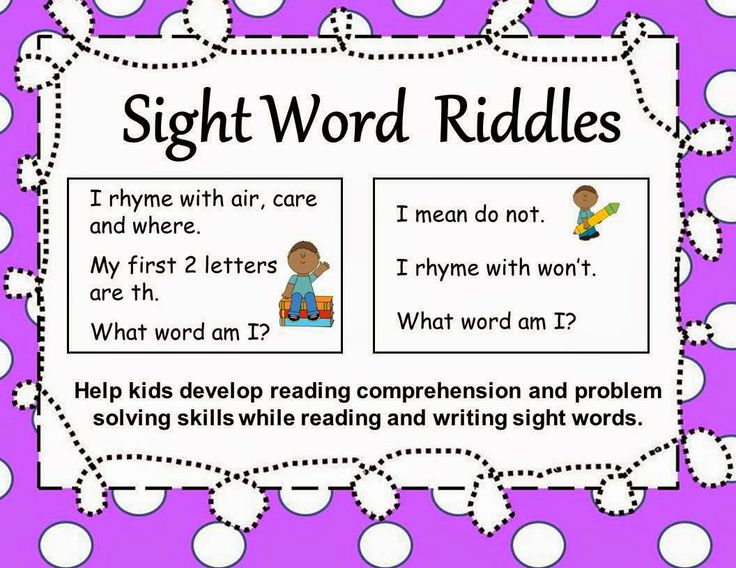 Their favorite exercises are game rhymes.
Their favorite exercises are game rhymes.
I bring to your attention the material that I use in my work.
Topics: “Sound [r]”; "Related Words"
Our fins would grow,
We would swim like ... (fish). nine0746 I would wave my flexible tail
And frolic like ... (fish).
Here he picks crumbs from the hook
Very small ... (fish).
Swims up, looking for food,
Large ... (fish).
"Eh. Lost my catch! -
I got angry ... (fisherman), -
The fish does not bite in any way,
It can be seen that I am bad ... (fisherman).
Almost crying from resentment,
But he sits all day ... (fishing).
The fisherman is terribly sorry,
What failed ... (fishing).
Speech therapist reads a poem, children add the sound combination TRY:
Our sister's kittens are s... ry, their paws are fast,
Their claws are sharp, their fur coats are s... ry, and their eyes are hi... ry!
"Pot of porridge" (sound automation [l])
Children pronounce the syllable LA in incomplete words.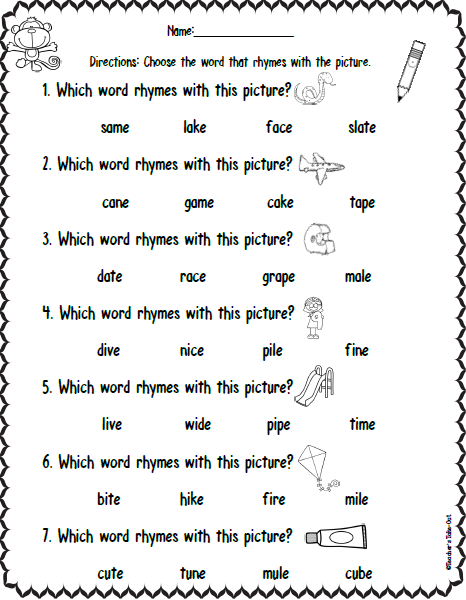
Boiling porridge in a pot..,
Hissing.., puffing..,
Lifting the lid..,
And crawling out...
With a hundred.., then with a hundred..,
corner.,
The whole apartment is occupied..,
Carefully the door is open..,
Roll down the stairs..,
Float along the way..,
Burned Masha porridge..,
Dasha porridge crawled into her mouth...
And ran into our pockets..,
Run into our sleeves...
And flow down the fingers of a hundred...
Our entire city was flooded…
Miracles! Well de...!
Rhymeball
Guys, let's play soon.
We will choose different words!
Say any words, okay?
But only such that it turns out ... (smoothly).
Speech therapist throws the ball and pronounces a word, the one who catches the ball answers with a word consonant with the name: stove - river, sheep, candle, heart, porch, ring; nine0746 bird - titmouse, match, tablet, pigtail ...
"Help and deceiver"
Rhyme can be a help.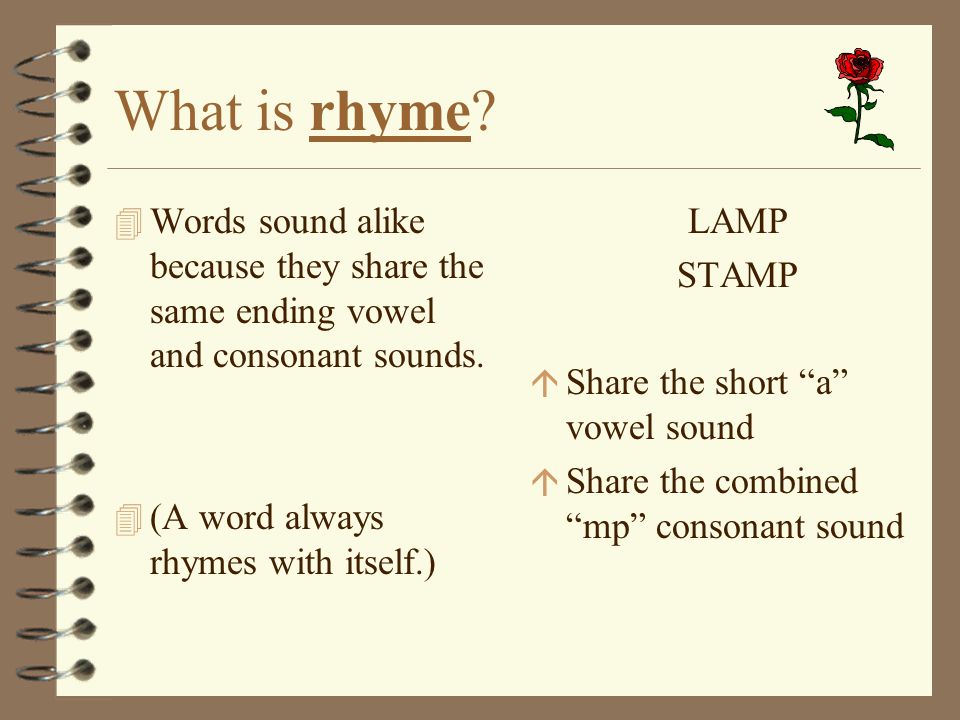 By rhyme, you can guess, for example, what kind of animal it is.
By rhyme, you can guess, for example, what kind of animal it is.
Instead of wool, the needles are all over,
The enemy of mice is prickly ...
The beast wears a horn on its nose
And is called ...
Among the animals is reputed to be a king,
He is called fearless ...
A log floats along the river.
Oh, and it's furious!
Those who fell into the river,
bite off their nose ...
Can swim all day
In ice-cold water ...
He knows a lot about sheep
Ferocious gray ...
He is lucky on himself
Own a house ...
And here are the verses with a rhyme-deceiver: one word is guessed, and the rhyme suggests a completely different one.
What the master says,
He will calmly repeat.
Ah yes voice, ah yes hearing!
What a smart girl…
Honey with raspberries is a dish
Food for...
I dig a hole day and night,
I don’t know the sun at all,
You won’t find my eyes…,
And my name is…
Underground, breaking through a hole,
Sleeping tired.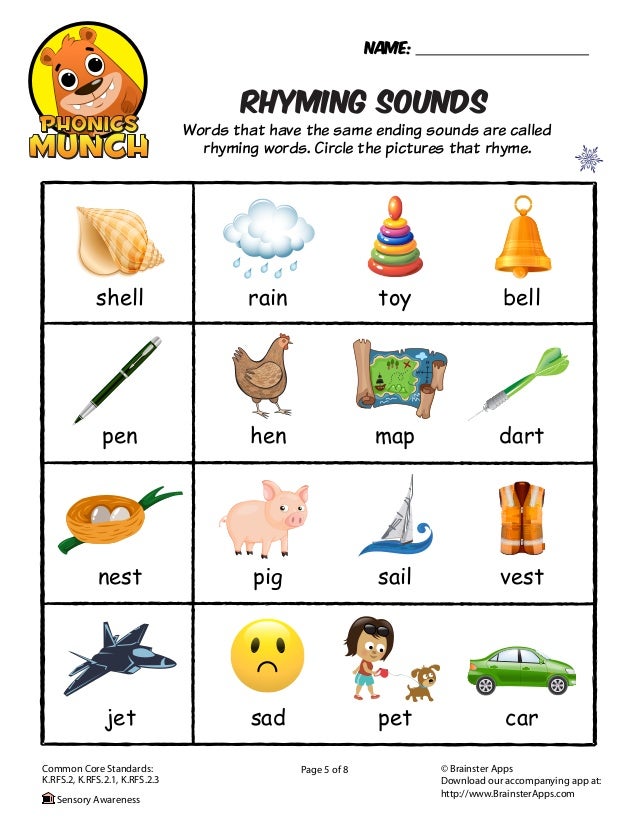 ..
..
Lives calmly, not in a hurry.
Carries a shield just in case.
On land and in water -
Everywhere she has her own,
At least three hundred years to live
Maybe ...
On two legs from all chases
The swift-footed one will rush off ...
Here, guys, miracles -
Bringing honey to the hive ...
"Rhymes"
Two stacks of paired pictures are selected for the game. Their names in the first pile rhyme with the names of the pictures in the second pile. One child takes a picture, the other finds a picture with a rhyming word. nine0005
90,000 rhyme selection - Alphabet games

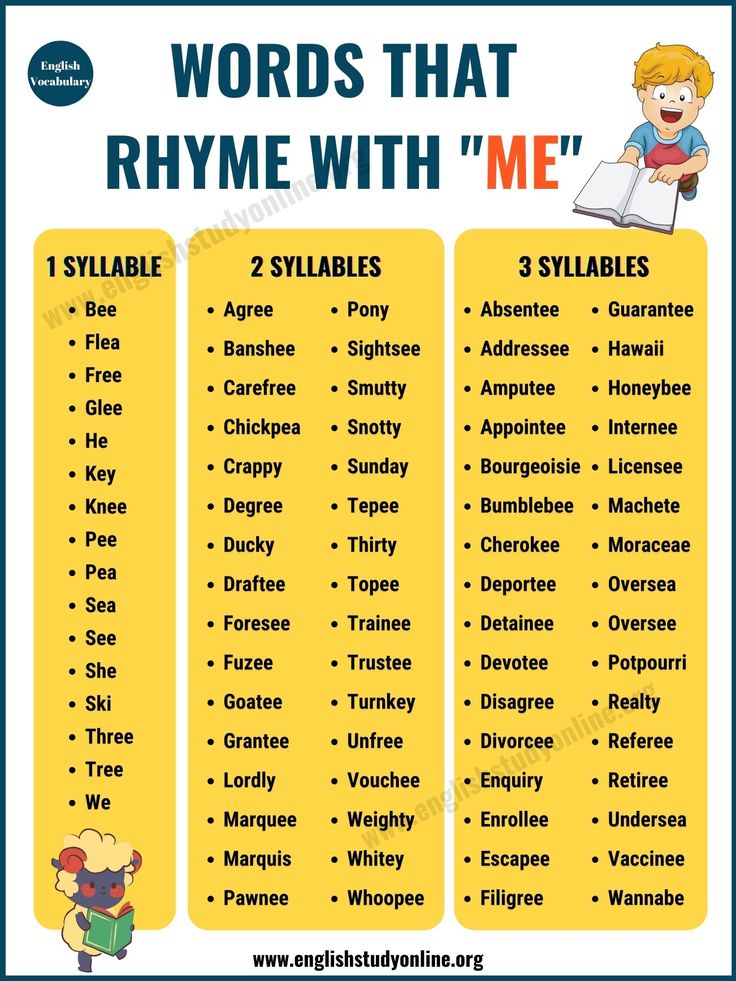
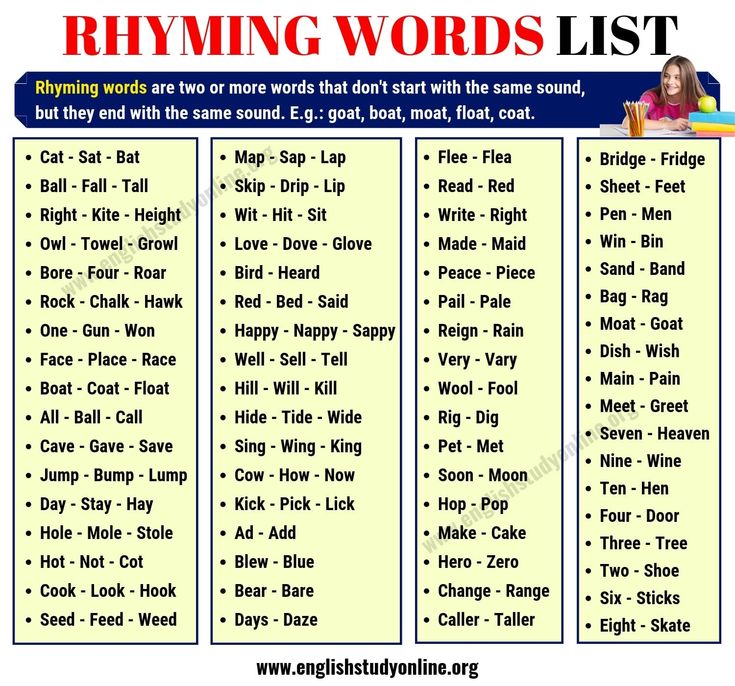 When reading poems with kids, pay attention to rhyming words.
When reading poems with kids, pay attention to rhyming words. 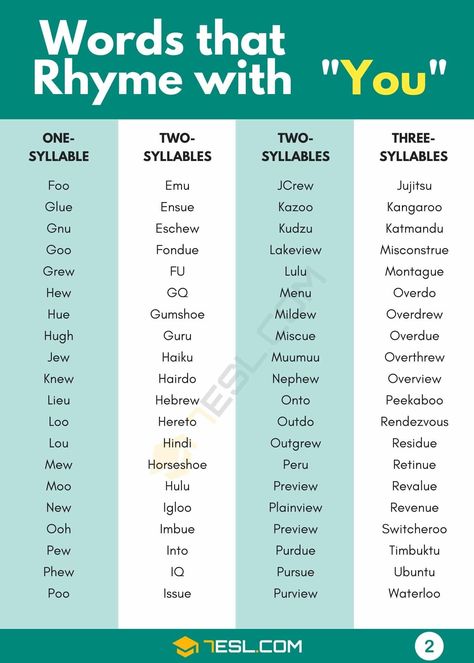
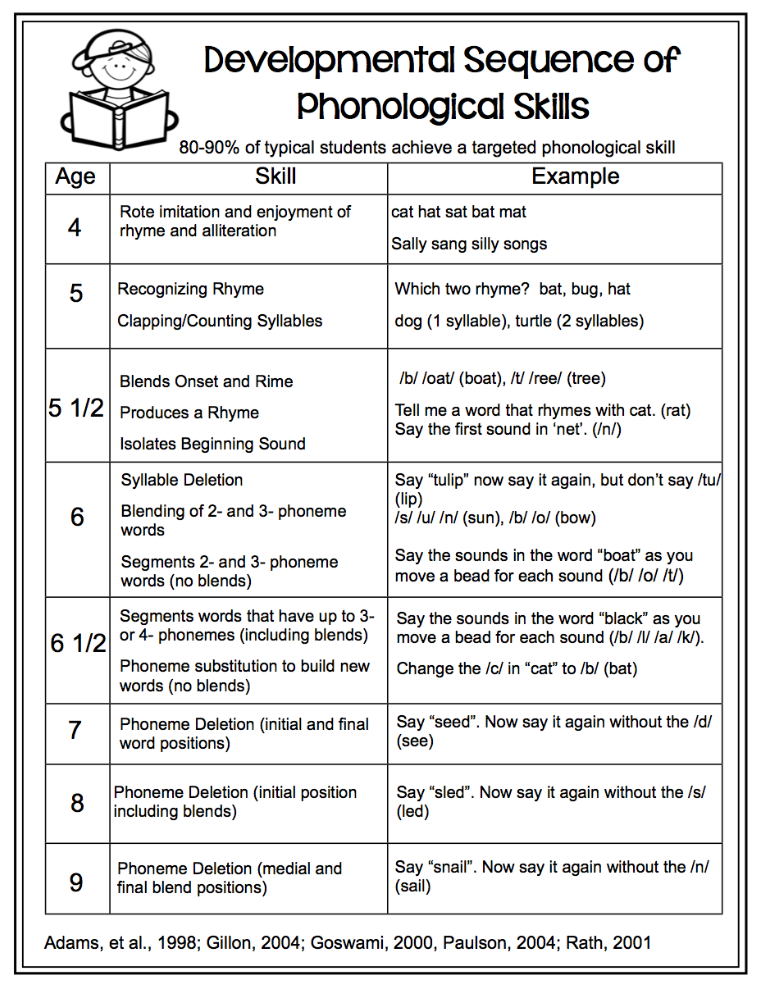 Start with the sun:
Start with the sun: 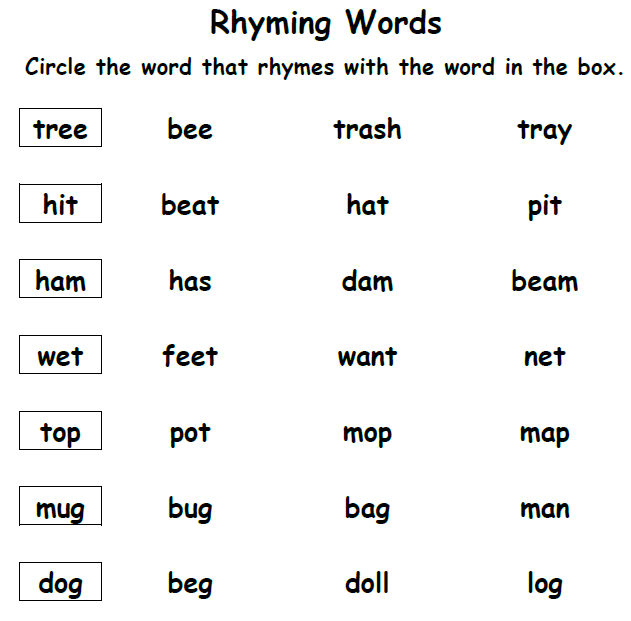 The child needs to finish the couplet in rhyme and draw the guessed part of the face.
The child needs to finish the couplet in rhyme and draw the guessed part of the face. 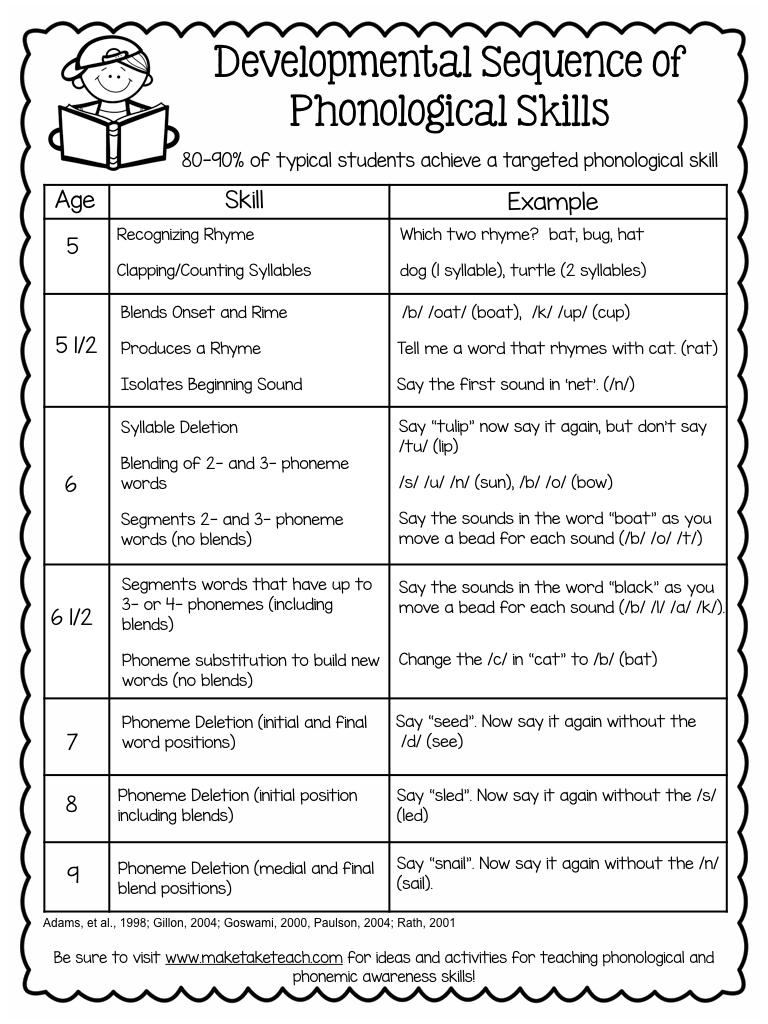
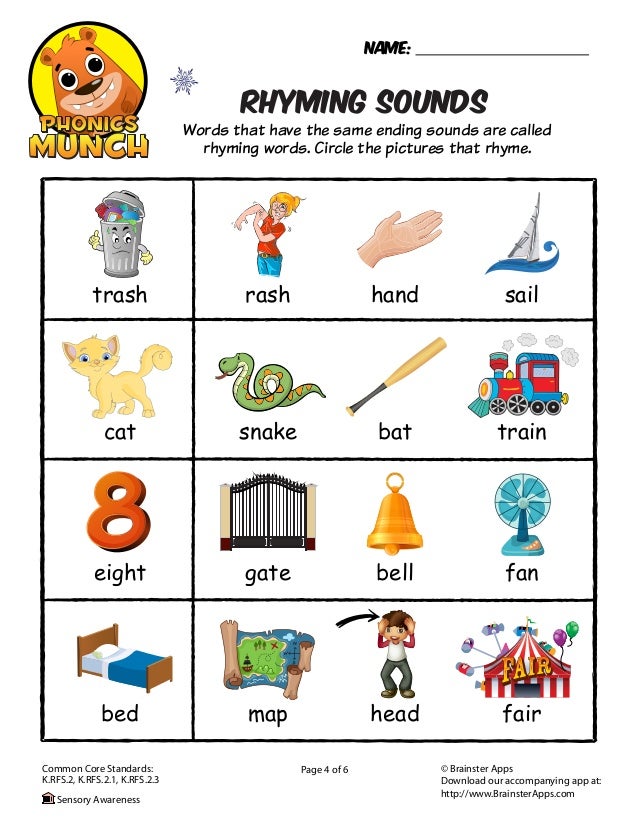
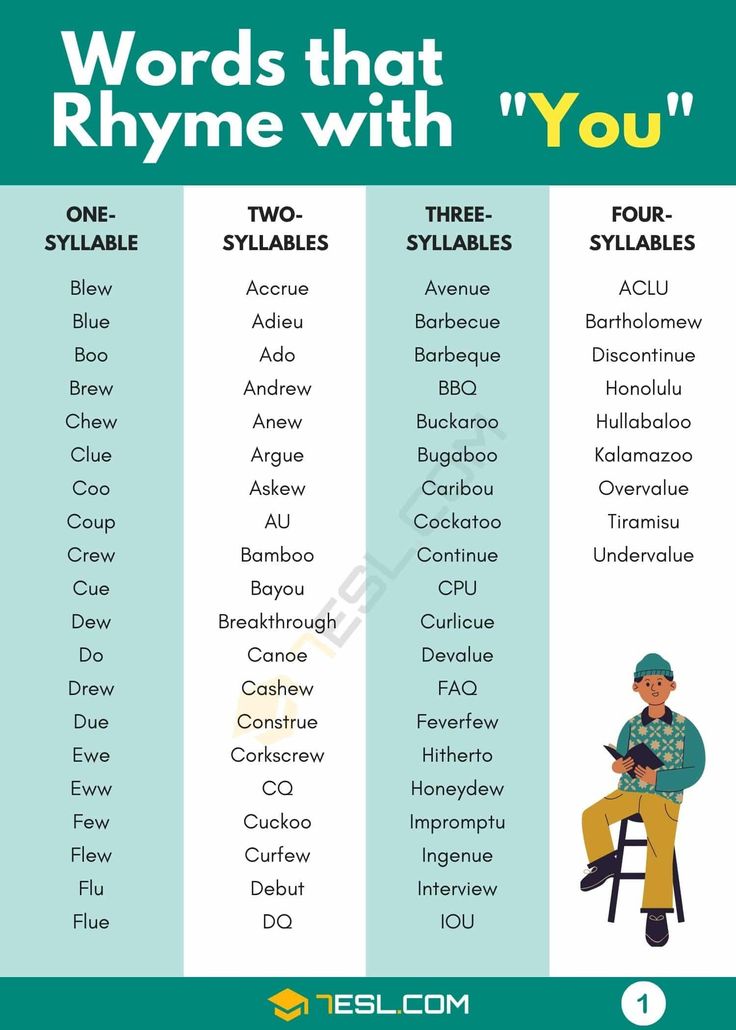 You name the words, and if they rhyme, the children should take a step to the side, and if not, then sit down.
You name the words, and if they rhyme, the children should take a step to the side, and if not, then sit down. 
